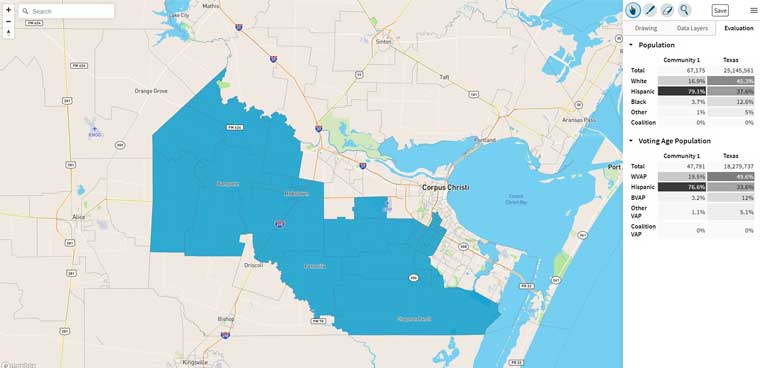Connecting state and local government leaders
At least a dozen states are giving residents access to the software and web tools needed to map out how their government should represent them.
At least a dozen states are giving residents access to the software and web tools needed to map out how their government should represent them.
After every census, redistricting authorities draw new boundaries for state legislative and congressional districts. Most states hold public hearings, even though half the country lacks laws requiring public input. Now, some states are going even further.
So far, Alaska, California, Colorado, Illinois, Michigan, Montana, New Mexico, Ohio, Oregon, Utah, Washington and Wisconsin have made online map-drawing tools publicly available and begun accepting submissions, according to Stateline research.
Several more states—Idaho, Michigan, Missouri, New Jersey and New York—are obligated by law to accept and consider maps drawn and submitted by the public, according to the National Conference of State Legislatures, a nonpartisan group that tracks state legislation.
Other states don’t have the same legal obligation, but they can use the public-generated maps to critique official maps or proposals and to evaluate state requirements and criteria.
Republican state Rep. Paul Ray, co-chair of Utah’s Legislative Redistricting Committee, said he was eager to see what residents would come up with this cycle. In 2011, a map drawn by a Utah resident was used to set the state’s school board boundaries.
Lawmakers need all the help they can get, he said. “It’s not as easy as you think.
“Drawing a map to encompass 75 House seats, 29 Senate seats is not that easy,” Ray told Stateline last month at a redistricting seminar hosted by the National Conference of State Legislatures. “Especially when redrawing district boundaries to comply with the Voting Rights Act and the principle of one person, one vote.”
If a map distributes voters or potential voters in a grossly uneven way, it can be challenged in court for being unconstitutional or violating the Voting Rights Act of 1965.
Public Access to Redistricting
Officials in 25 states are not required to have public input during the redistricting process, but most states have held hearings and accepted public maps in previous cycles.
In the past 30 years, new technology has made it much easier to draw new boundaries that follow the rules while also enabling maps that benefit a party or candidate without flouting the law.
Glenn Koepp, former secretary of the Louisiana Senate, worked in the legislature from 1972 to this past July, when he died of a heart attack. His first redistricting cycle was in 1981. In an early July interview with Stateline, he said Senate staff would spend weeks back then drawing lines on paper maps pinned up to walls, then would use a mainframe computer to analyze the demographics of the districts they created.
“We had one computer that could do this and the software cost thousands of dollars,” Koepp said during a reception at the NCSL redistricting seminar.
“At the time no one had a personal computer or extensive training, so you’d spend lots of sleepless nights just waiting for the computer to spit back the data,” he added.
By 2010, new software allowed mapmakers to generate thousands of possibilities in a fraction of the time. Florida, Idaho and Utah were some of the first states to purchase these online redistricting tools as well as allow the public to use them and submit maps.
Idaho Deputy Secretary of State Jason Hancock said the reapportionment commission there in the previous cycle looked at every public map that was submitted.
“To what extent, I don’t know,” Hancock said. “There may have been nuggets of ideas in some of those different maps that they picked up and incorporated in some of the maps that they ended up approving.”
Idaho plans to again provide an online version of its redistricting software this year.
Florida Republican state Sen. Ray Rodrigues, who chairs his state’s Senate Reapportionment Committee, said his panel has not decided whether the software lawmakers are using for redistricting will be made available to the public. He said they will be taking map submissions, but it is too early in the process to know how those will be used.
“While I encourage the public to submit maps, I also encourage them to be cognizant of the Florida Constitution, statutes and federal requirements,” he said. “The commitment that I’m making as chair is that the maps we send to the floor will be compliant with those requirements.”
In 2013, residents of Minneapolis used DistrictBuilder, a free, open-source redistricting software, to submit maps. Those maps led to the creation of two voting districts and the election of the first Hispanic and Somali American to the city council, according to Michael McDonald, co-creator of DistrictBuilder. This year, Dane County, Wisconsin, which includes the state capital Madison, began using DistrictBuilder as its official tool for public submissions.
Dave Bradlee, who released Dave’s Redistricting App in 2010, said technology has made it easier for official mapmakers to comply with the law—but also has allowed the creation of more sophisticated maps that benefit one group or another in subtle ways.
“Gerrymanders are legal—people can draw maps to help themselves. It’s still legal to do that in a lot of places,” Bradlee said. “What this technology does is help people understand what gerrymandering is and how people in power use it to gain or stay in power.”
As users draw boundaries with Dave’s Redistricting App, they can see color-coded maps that sum up each district’s population and racial composition. The Oklahoma State Senate officially partnered with Dave’s Redistricting App and provides instructions on how to use the software on its website.
The latest version of Dave’s Redistricting App includes national and state electoral data and voting results to allow users to evaluate maps being drawn by lawmakers in real time.
Another important feature in this year’s versions of Dave’s Redistricting, DistrictBuilder and Districtr, another free online redistricting tool, is the ability to draw “communities of interest.”

A screenshot of a Districtr.org map submitted to the Texas Civil Rights Project for consideration by state legislators during the redistricting process. A local voting rights group used state health data to draw a district that would keep intact a community at high risk of lead exposure in Nueces County, Texas. Screenshot of Districtr.org
A community of interest is a community or group of people who share common policy concerns or demographic traits and would benefit from being maintained in the same electoral district, according to Joaquin Gonzalez, a voting rights attorney at the Texas Civil Rights Project in Austin. The legal advocacy group has a network of pro bono attorneys that spans the state.
He said a group of neighborhoods that funnel into the same school, a geographic region bound by landmarks such as rivers and lakes, or a community whose residents share a racial or ethnic background, religion or socioeconomic status can be a community of interest.
In the past month, the Texas Civil Rights Project has held virtual training sessions for people interested in drawing and submitting their own community of interest maps using Districtr. The project will send the maps to the legislature for consideration. So far, people from across the state have submitted about 40 maps.
Members of the League of Women Voters in Corpus Christi created a map of Nueces County that identified communities at risk of elevated lead levels in their drinking water following a 2020 study.
“We believe that redistricting can have a significant impact on this issue because the communities most impacted by the highest levels of lead must be kept intact to focus resources and remedies in neighborhoods that most need help, neighborhoods that often have people of color and/or people with low income,” league officials wrote in an email to Stateline.
Texas is one of 25 states that do not require public hearings or map submissions from the public. But like most states, it has a history of taking public input in the lead-up to line drawing, according to the Princeton Gerrymandering Project.
Residents in states without an official portal can submit their maps during public hearings.
This article was first posted on Stateline, an initiative of The Pew Charitable Trusts.



